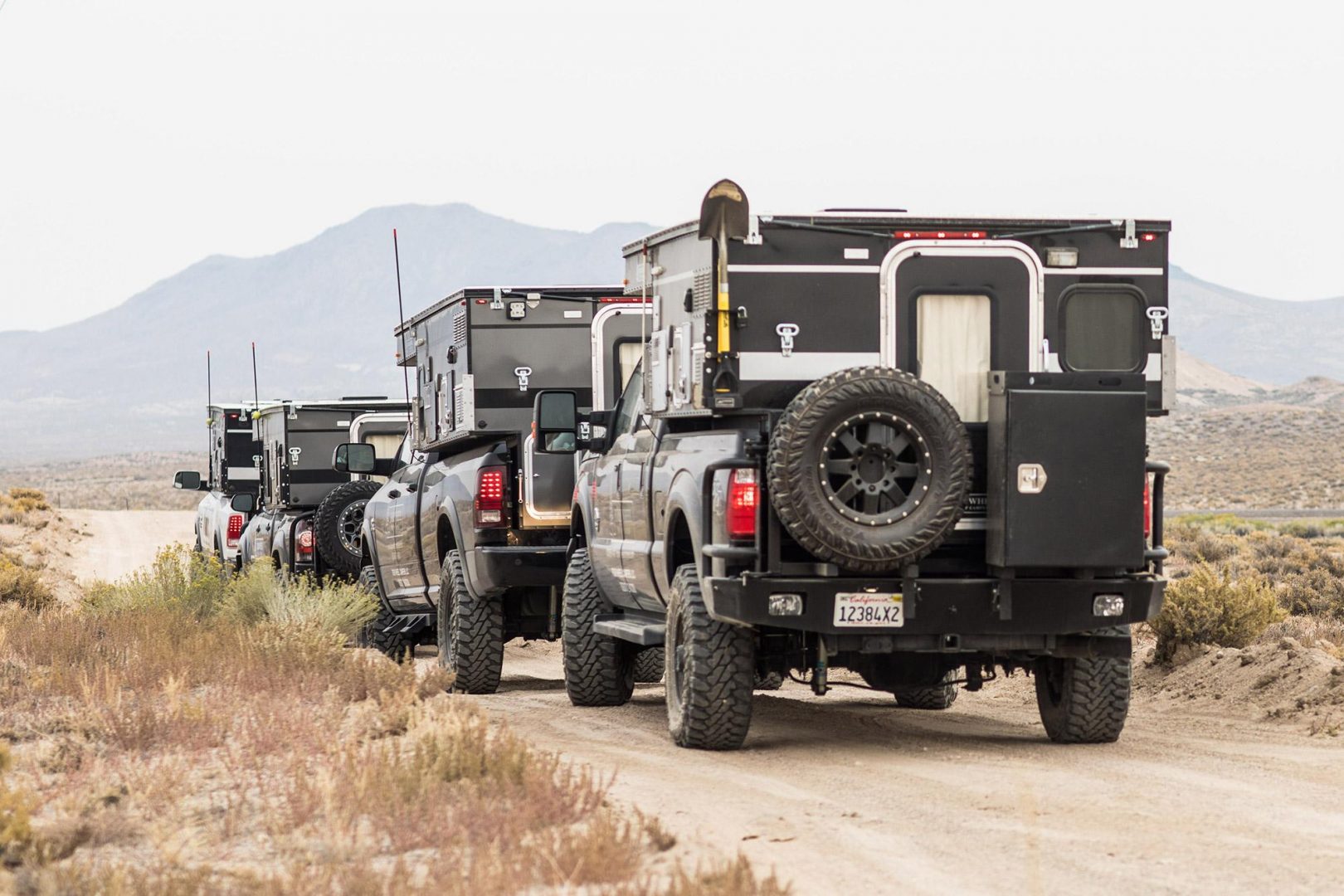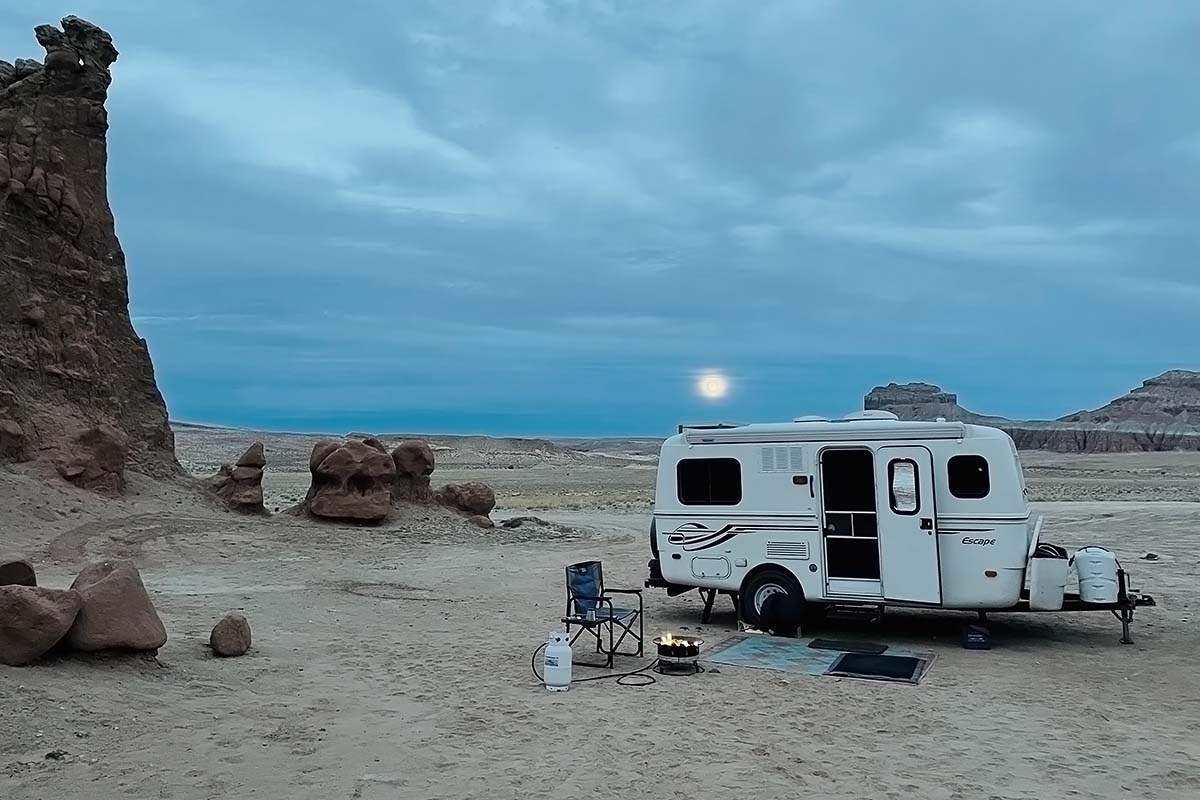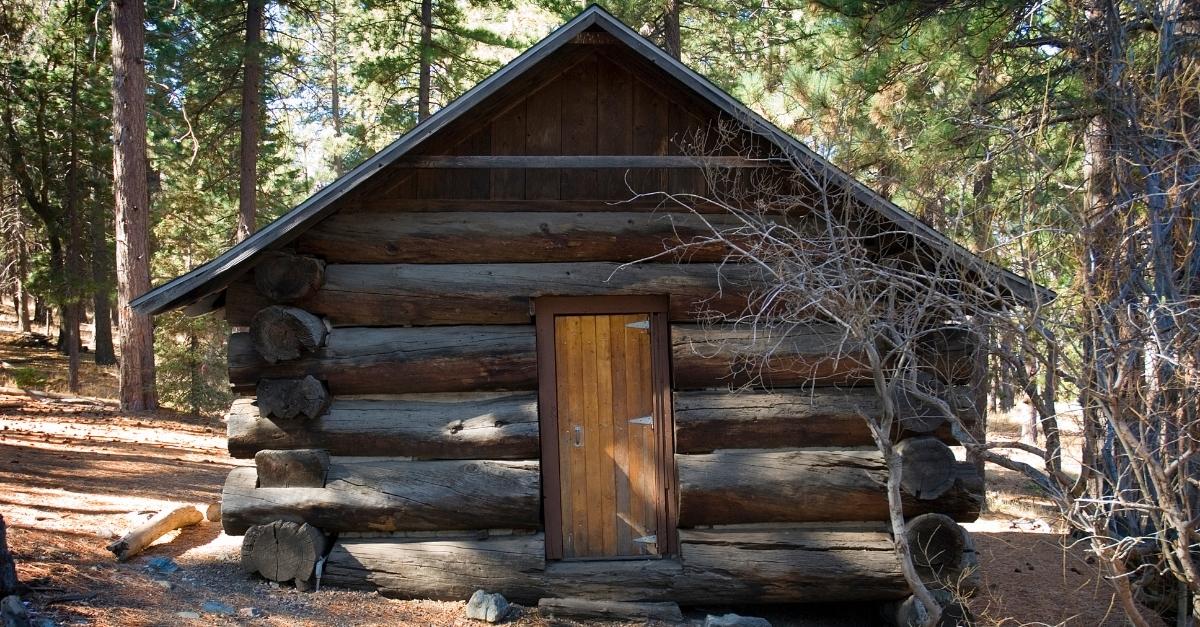Campers for off grid living – Campers for off-grid living represent a thrilling escape, a chance to disconnect from the digital world and reconnect with nature’s raw beauty. Imagine waking to breathtaking sunrises, starlit nights undisturbed by city lights, and the freedom to explore hidden trails and untouched landscapes. This isn’t just about camping; it’s about embracing a simpler, more self-sufficient lifestyle, where adventure awaits around every bend.
This guide unveils the secrets to making this dream a reality, exploring various camper types, essential systems, and crucial skills for a successful off-grid adventure.
From meticulously planned van conversions to rugged truck campers, we’ll delve into the practical considerations of choosing the perfect mobile home for your off-grid journey. We’ll navigate the complexities of power generation, water management, and waste disposal, equipping you with the knowledge to create a comfortable and sustainable living space. Learn about essential off-grid skills, safety precautions, and the legal aspects of embracing this unique lifestyle.
Prepare to be inspired to embark on your own unforgettable off-grid adventure.
Essential Off-Grid Systems in Campers
Embarking on the adventure of off-grid living in a camper requires careful consideration of several crucial systems. Your comfort, safety, and self-sufficiency depend on the seamless integration and reliable performance of these essential components. Let’s explore the key systems that will transform your camper into a truly independent mobile home.
Water Systems for Off-Grid Campers
Access to clean water is paramount in off-grid living. Several methods exist to ensure a reliable supply, each with its own advantages and disadvantages. Careful planning and system selection are vital for long-term success.
- Tank Storage: This involves storing potable water in onboard tanks. The size of the tank will dictate how long you can go between refills. Regular cleaning and maintenance are crucial to prevent contamination.
- Rainwater Collection: Collecting rainwater from your camper’s roof using gutters and directing it to a storage tank provides a sustainable water source, especially in areas with regular rainfall. Filtration is essential to remove impurities.
- Water Filtration: Regardless of your primary water source, a robust filtration system is vital. This can range from simple filters to more sophisticated multi-stage systems capable of removing bacteria, viruses, and other contaminants. Consider the specific contaminants present in your chosen water source when selecting a filter.
Power Generation for Off-Grid Campers
Reliable power is the backbone of comfortable off-grid living. A variety of power generation options exist, each with its own set of trade-offs. Choosing the right system depends on your energy needs, budget, and the environment in which you’ll be camping.
| Power Source | Pros | Cons |
|---|---|---|
| Solar Panels | Renewable, clean energy; relatively low maintenance; silent operation. | Initial cost can be high; output depends on sunlight availability; may require battery storage. |
| Generators | Reliable power output; readily available fuel; can handle high energy demands. | Noise pollution; fuel consumption; requires regular maintenance; produces emissions. |
| Wind Turbines | Renewable energy; silent operation (except for wind noise). | Requires consistent wind; can be visually obtrusive; high initial cost; maintenance can be complex. |
Waste Management Solutions for Off-Grid Campers
Responsible waste management is critical for environmental stewardship and maintaining a hygienic living space. Various solutions exist to handle both blackwater (toilet waste) and greywater (shower, sink, and dishwater).
You also will receive the benefits of visiting off grid living solar generator today.
- Composting Toilets: These toilets break down waste naturally, minimizing environmental impact. They require regular maintenance and composting materials. Suitable for longer stays in one location.
- Greywater Recycling: Systems that filter and reuse greywater for irrigation or toilet flushing can significantly reduce water consumption. Effective filtration is crucial to prevent contamination.
- Waste Tank Management: For blackwater and greywater storage, regular emptying is necessary. Proper disposal procedures should be followed to avoid environmental contamination. Consider the availability of dump stations in your travel plans.
Heating and Cooling Systems for Off-Grid Campers
Maintaining a comfortable temperature inside your camper is essential for both comfort and health. Off-grid heating and cooling options require careful consideration of energy efficiency and fuel availability.
- Propane Heating: Propane heaters provide efficient heating but require a reliable propane supply. Proper ventilation is crucial to prevent carbon monoxide poisoning.
- Solar-Powered Fans/Ventilation: Passive ventilation and solar-powered fans can help regulate temperature and reduce reliance on energy-intensive heating or cooling systems. Effective for mild climates.
- Diesel or Kerosene Heaters: These options provide reliable heating but require careful handling of fuel and proper ventilation. They are suitable for colder climates.
Off-Grid Living Skills and Safety: Campers For Off Grid Living

Embarking on an off-grid adventure requires more than just a well-equipped camper; it demands a comprehensive understanding of essential skills and a proactive approach to safety. Successfully navigating this lifestyle hinges on preparedness, resourcefulness, and a deep respect for the environment. This section Artikels the key skills and safety measures crucial for a fulfilling and secure off-grid experience.
Essential Off-Grid Skills, Campers for off grid living
Mastering several key skills significantly enhances the safety and enjoyment of off-grid living. These skills range from basic vehicle maintenance to resource management, all contributing to a self-sufficient and sustainable lifestyle. Proficiency in these areas reduces reliance on external support and fosters confidence in handling unexpected situations.
- Basic Vehicle Maintenance: Understanding fundamental vehicle mechanics, including tire changes, jump-starting, and basic engine diagnostics, is paramount. This knowledge can prevent inconvenient delays and potentially dangerous situations far from civilization. Imagine a flat tire miles from help – knowing how to change it yourself is invaluable.
- Water Purification: Access to clean drinking water is critical. Knowing how to purify water using methods such as boiling, chemical treatment (e.g., using iodine tablets or water purification drops), or filtration is essential for preventing waterborne illnesses. A reliable water filter or purification system should be part of your essential gear.
- Fire Safety and Management: Fire is a vital resource for cooking, heating, and signaling for help. However, it also presents significant risks. Understanding fire starting techniques, building safe fire pits, and properly extinguishing fires is crucial for preventing wildfires and accidents. Always have a fire extinguisher and shovel readily available.
- Basic First Aid and Wilderness Medicine: The ability to administer basic first aid and handle common wilderness injuries is crucial. A comprehensive first-aid kit containing supplies for treating cuts, burns, and other injuries, along with a knowledge of basic wilderness medicine techniques, can make the difference between a minor setback and a serious emergency.
Personal Safety and Security
Off-grid living presents unique safety challenges. Proactive measures are necessary to mitigate risks and ensure personal security. A well-defined safety plan, incorporating both preventative measures and emergency procedures, is paramount.
- Campsite Selection: Choose campsites carefully, considering factors such as proximity to water sources, potential hazards (e.g., wildlife, steep terrain), and accessibility for emergency vehicles. Avoid isolated locations.
- Wildlife Awareness: Learn to identify and react appropriately to local wildlife. Store food securely to avoid attracting animals, and maintain a safe distance from any wild creatures you encounter. Carry bear spray in bear country.
- Communication Plan: Establish a reliable communication plan with family or friends, including regular check-in times and emergency contact information. Consider carrying a satellite phone or personal locator beacon (PLB) in areas with limited cell service.
- Self-Defense Measures: Consider carrying appropriate self-defense tools, such as pepper spray or a personal alarm, especially if traveling alone or in remote areas. Be aware of your surroundings and trust your instincts.
Resource Conservation Strategies
Conserving resources is crucial for sustainable off-grid living. Efficient use of water, energy, and food minimizes environmental impact and extends the lifespan of your supplies. Adopting mindful practices becomes a way of life, not just a temporary measure.
- Water Conservation: Collect rainwater, use low-flow showerheads, and minimize water usage for cleaning. Repurpose greywater for non-potable uses (e.g., watering plants).
- Energy Conservation: Utilize solar power efficiently, minimize the use of electricity-consuming appliances, and insulate your camper to reduce energy loss. Consider using energy-efficient LED lighting.
- Food Preservation and Management: Plan your meals carefully, minimize food waste, and utilize methods like canning, drying, or freezing to preserve food for longer periods. Grow your own food where feasible.
Minimizing Environmental Impact
Responsible off-grid living necessitates minimizing the environmental footprint. Practicing Leave No Trace principles and adopting eco-friendly habits are essential for preserving the natural beauty of the areas we explore.
- Waste Management: Practice proper waste disposal, including composting organic waste and packing out all non-biodegradable trash. Minimize the use of single-use plastics.
- Sustainable Campsite Practices: Avoid disturbing vegetation, minimize campfire impact, and choose campsites that minimize environmental disruption. Respect wildlife and their habitats.
- Responsible Resource Use: Use water and energy judiciously. Avoid unnecessary consumption and strive to leave the environment as you found it, or even better.
Legal and Regulatory Considerations

Embarking on the off-grid journey requires careful navigation of the legal landscape. Understanding and adhering to local, state, and federal regulations is crucial for a peaceful and sustainable off-grid existence. Failure to do so can lead to significant legal issues and disrupt your carefully planned escape from the grid.The legal and regulatory environment surrounding off-grid living varies significantly depending on your location.
Factors such as zoning laws, environmental regulations, and property ownership rights all play a critical role in determining what’s permissible and what’s not. Ignoring these considerations can result in fines, legal battles, and even the forced removal from your chosen off-grid haven.
Land Use Permits and Zoning Regulations
Securing the necessary land use permits is paramount. Zoning regulations dictate how land can be used within a specific area. These regulations often restrict building sizes, types of structures allowed, and the distance a structure must be from property lines or natural features. For example, some jurisdictions may prohibit the construction of dwellings outside designated development zones, while others may have strict requirements for septic systems and water sources.
Before purchasing or leasing land for off-grid living, it is essential to thoroughly research and understand the applicable zoning regulations and obtain all required permits. Failure to do so could lead to costly fines and legal challenges.
Waste Disposal and Environmental Regulations
Responsible waste disposal is a critical aspect of off-grid living. Regulations regarding wastewater treatment, garbage disposal, and hazardous waste management vary considerably. Many jurisdictions require the installation of approved septic systems for wastewater treatment. Improper disposal of waste can lead to significant environmental damage and hefty fines. For instance, illegal dumping of trash or untreated sewage can contaminate water sources and harm wildlife.
Understanding and complying with these regulations is crucial for both environmental protection and legal compliance. Consider composting toilets and greywater recycling systems as environmentally friendly alternatives.
Access to Resources and Services
Accessing essential resources and services while living off-grid presents unique challenges. Regulations related to water rights, firewood harvesting, and access to public roads can impact your off-grid lifestyle. Some areas may restrict the amount of water you can draw from a natural source, while others may regulate the collection of firewood from public lands. Understanding these regulations and obtaining necessary permits or licenses is crucial.
For example, a permit may be required to build a well or to access a specific water source. Furthermore, ensure you have a plan for accessing emergency services in remote locations. This might involve establishing communication systems and having a well-defined emergency plan in place.
Embarking on the off-grid journey with a camper is more than just a vacation; it’s a transformative experience. It’s about reclaiming your freedom, embracing self-reliance, and forging a deeper connection with the natural world. By understanding the nuances of camper selection, essential systems, and crucial off-grid skills, you can craft an adventure tailored to your dreams. This guide serves as your compass, pointing you towards a life less ordinary, a life lived on your own terms, amidst the breathtaking beauty of the untamed wilderness.
So, pack your bags, ignite your adventurous spirit, and prepare for the journey of a lifetime.



